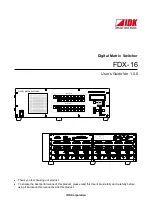
Chapter 13
| Basic Administration Protocols
Power over Ethernet
– 346 –
◆
If the power demand from devices connected to all switch ports exceeds the
power budget set for the switch, the port power priority settings are used to
control the supplied power. For example:
■
If a device is connected to a low-priority port and causes the switch to
exceed its budget, power to this port is not turned on.
■
If a device is connected to a critical or high-priority port and would cause
the switch to exceed its power budget as determined during bootup,
power is provided to the port only if the switch can drop power to one or
more lower-priority ports and thereby remain within its overall budget.
■
If a device is connected to a port after the switch has finished booting up
and would cause the switch to exceed its budget, power will not be
provided to that port regardless of its priority setting.
■
If priority is not set for any ports, and there is not sufficient power to supply
all of the ports, port priority defaults to Port 1, Port 2, Port 3 ... Port 24, with
available power being supplied in that sequence.
■
If priority is not set for any ports, and PoE consumption exceeds the
maximum power provided by the switch, power is shut down in the reverse
sequence, starting from Port 24.
Parameters
These parameters are displayed:
◆
Port
– The port number on the switch. (Range: 1-8)
◆
Admin Status
– Enables PoE power on a port. Power is automatically supplied
when a device is detected on a port, providing that the power demanded does
not exceed the switch or port power budget. (Default: Enabled)
◆
Mode
– Shows whether or not PoE power is being supplied to a port.
◆
Time Range Name
– Name of a time range. If a time range is set, then PoE will
be provided to an interface during the specified period.
◆
Time Range Status
– Indicates if a time range has been applied to an interface,
and whether it is currently active or inactive.
◆
Priority
– Sets the power priority for a port. (Options: Low, High or Critical;
Default: Low)
◆
Power Allocation
– Sets the power budget for a port. (Range: 3000-30000
milliwatts; Default: 30000 milliwatts)
◆
Power Consumption
– Current power consumption on a port.
Summary of Contents for GEL-1061
Page 14: ...Contents 14...
Page 28: ...Section I Getting Started 28...
Page 38: ...Chapter 1 Introduction System Defaults 38...
Page 40: ...Section II Web Configuration 40...
Page 60: ...Chapter 2 Using the Web Interface Navigating the Web Browser Interface 60...
Page 164: ...Chapter 6 Address Table Settings Issuing MAC Address Traps 164...
Page 192: ...Chapter 8 Congestion Control Storm Control 192...
Page 204: ...Chapter 9 Class of Service Layer 3 4 Priority Settings 204...
Page 216: ...Chapter 10 Quality of Service Attaching a Policy Map to a Port 216...
Page 430: ...Chapter 14 Multicast Filtering MLD Snooping Snooping and Query for IPv4 430...
Page 436: ...Chapter 15 IP Tools Address Resolution Protocol 436...
Page 474: ...Section III Appendices 474...
Page 492: ...Glossary 492...
Page 500: ...E052016 ST R02 150200001416A...
















































